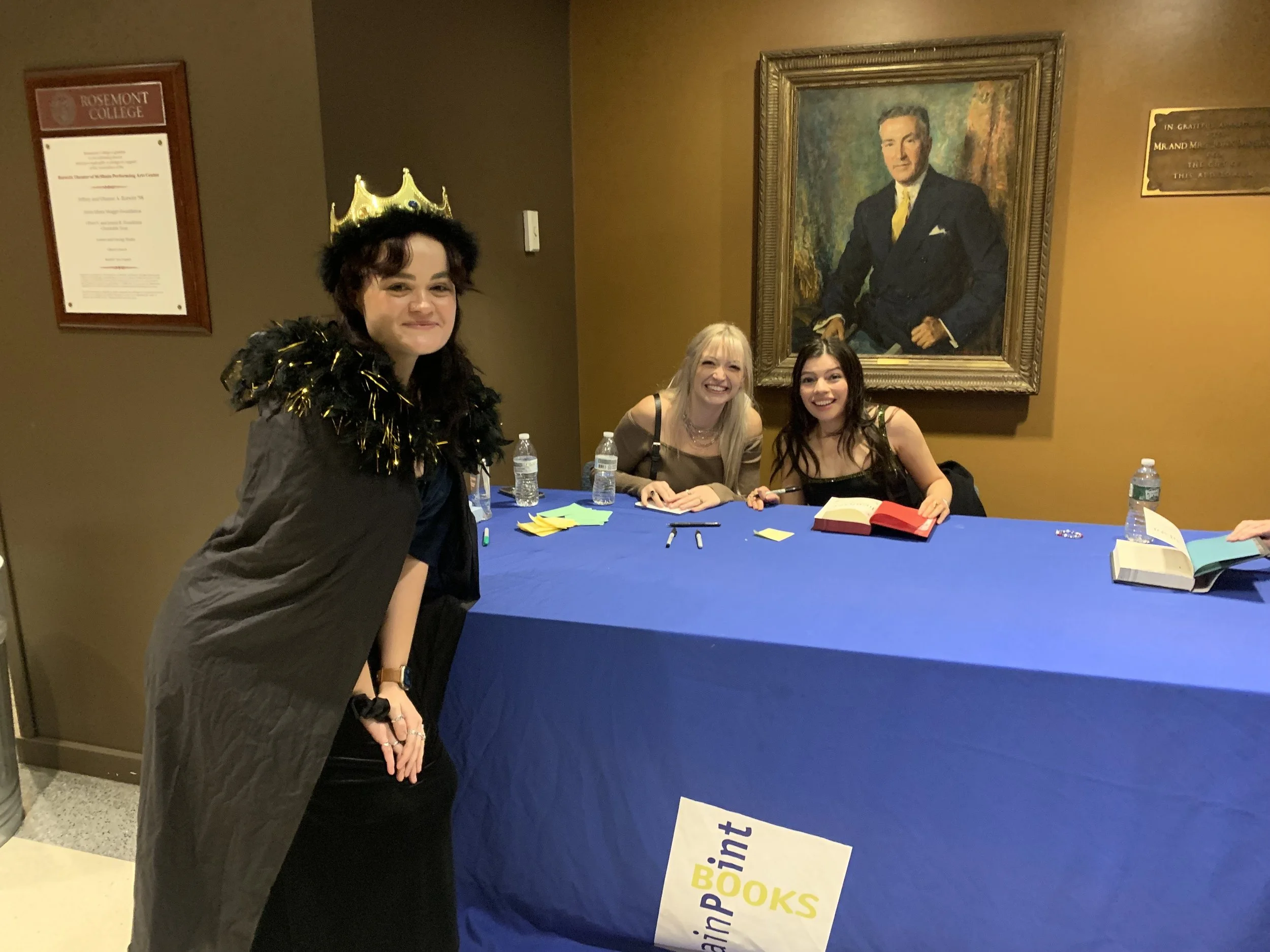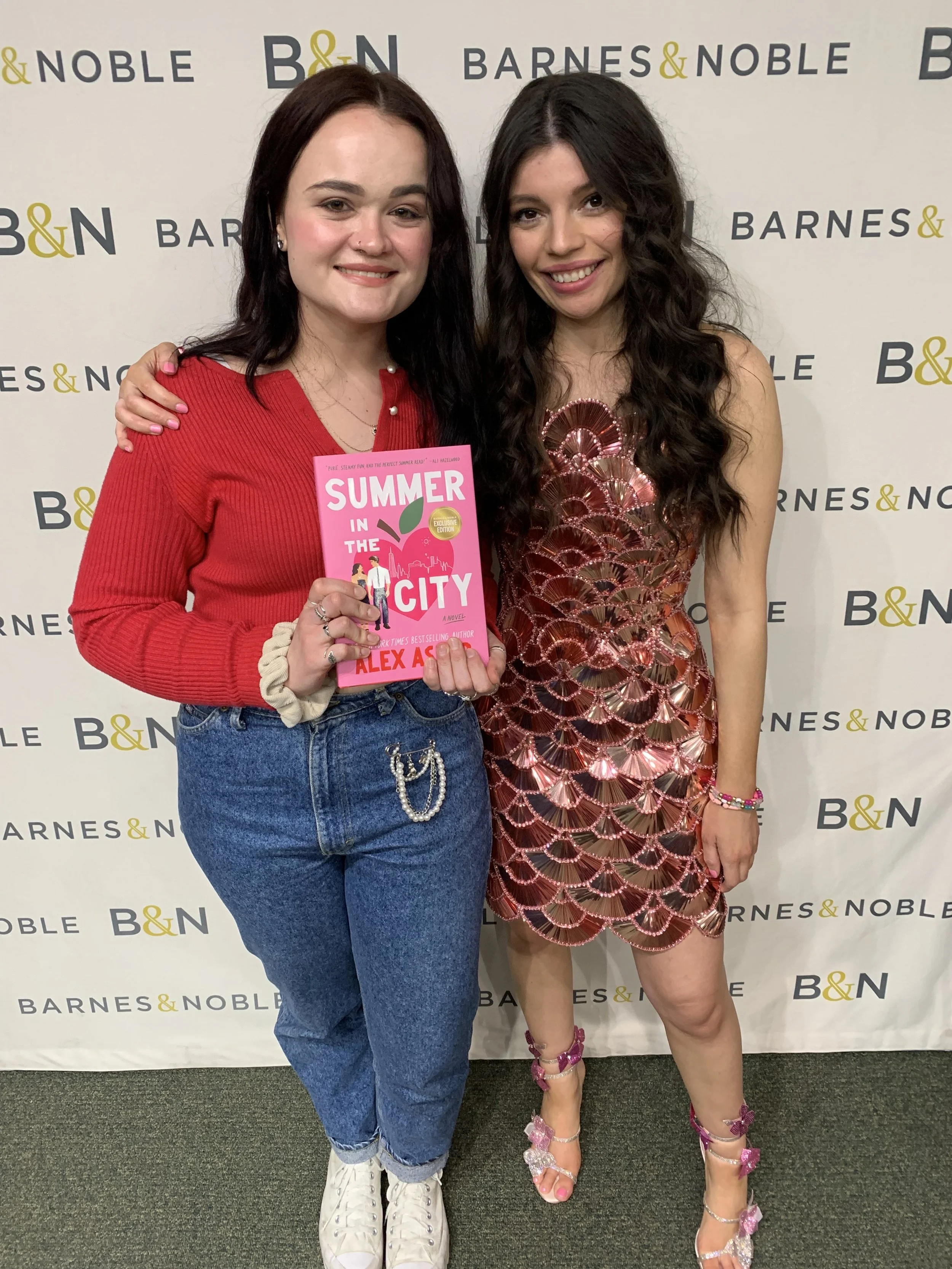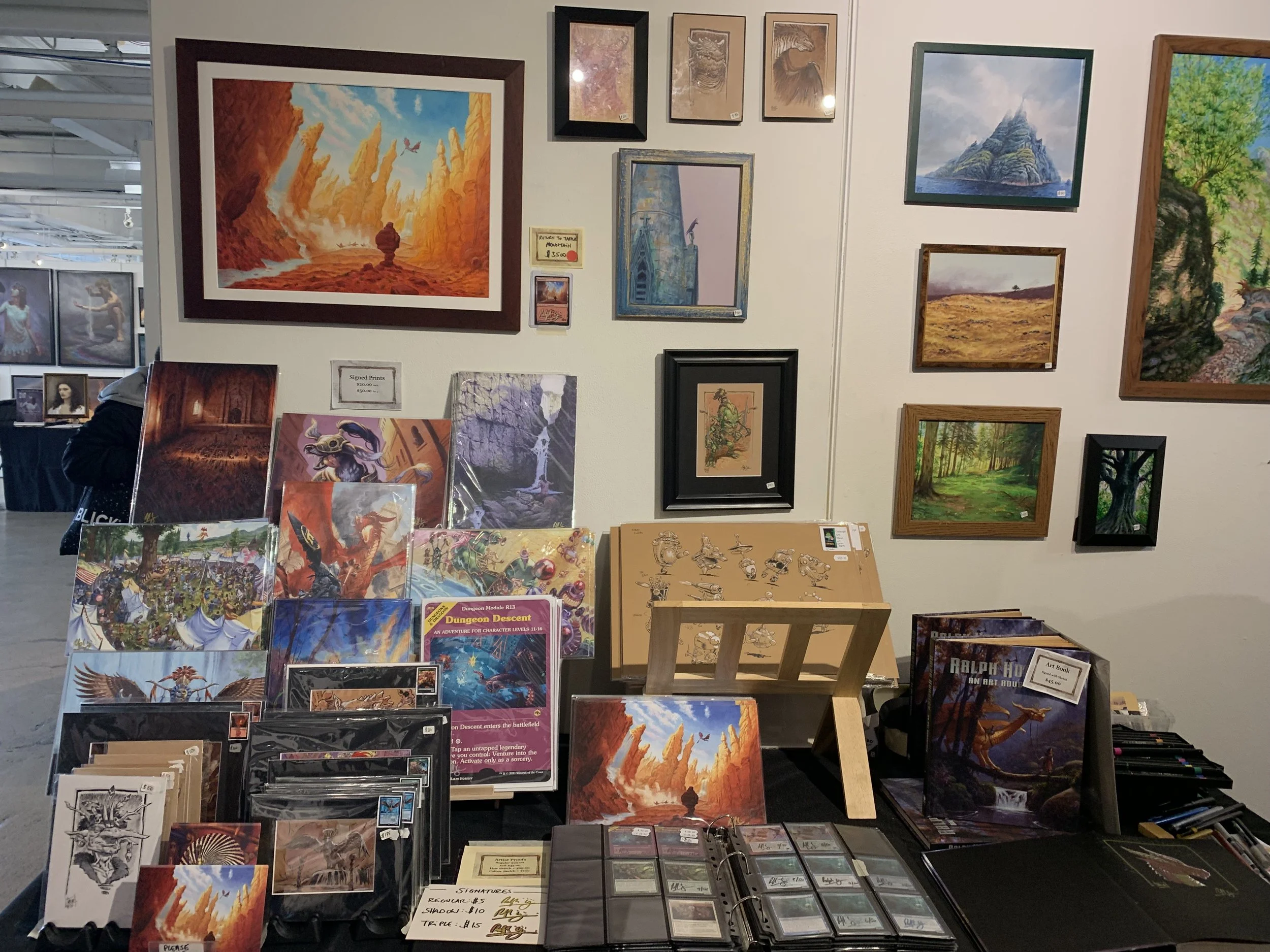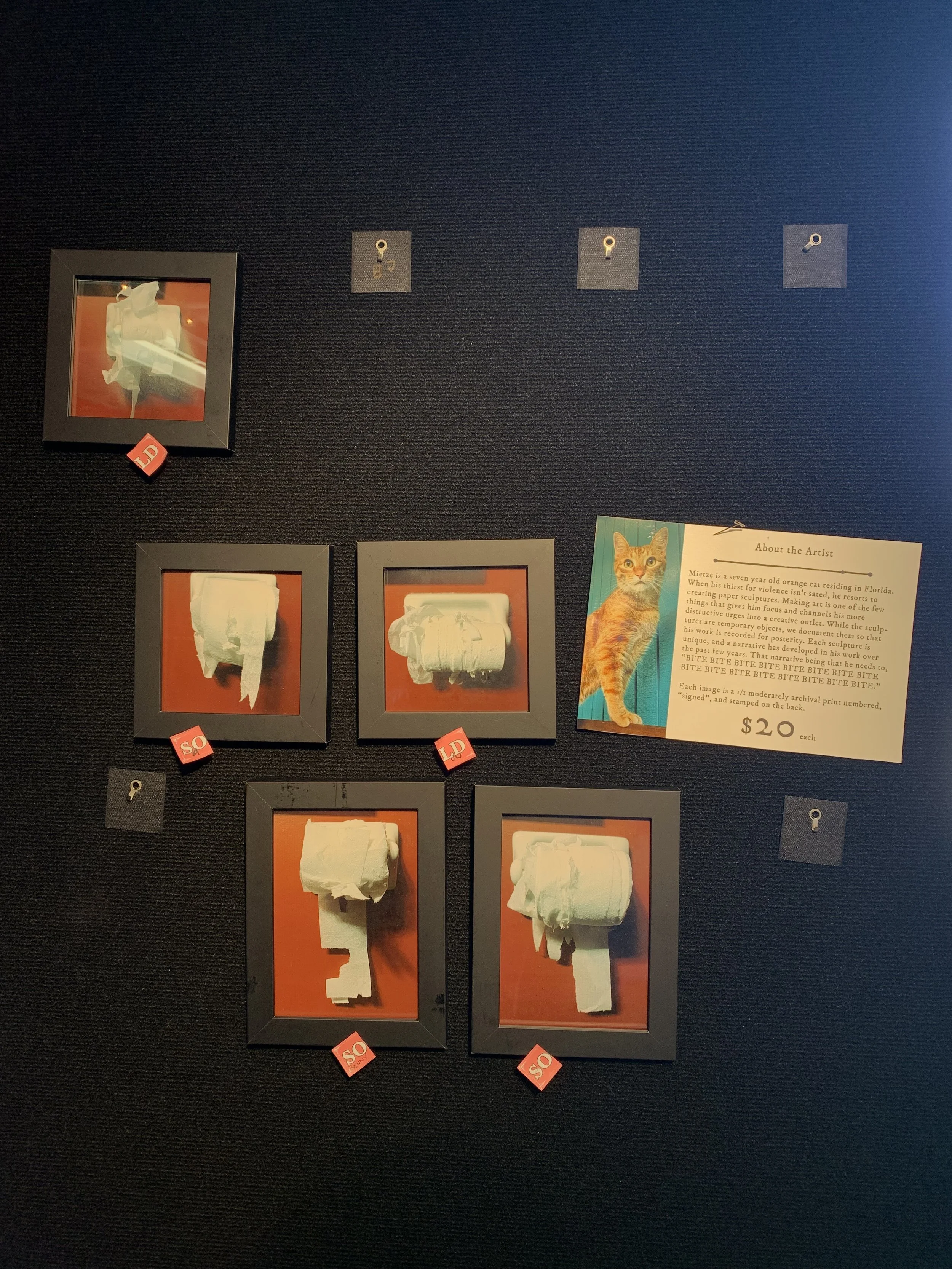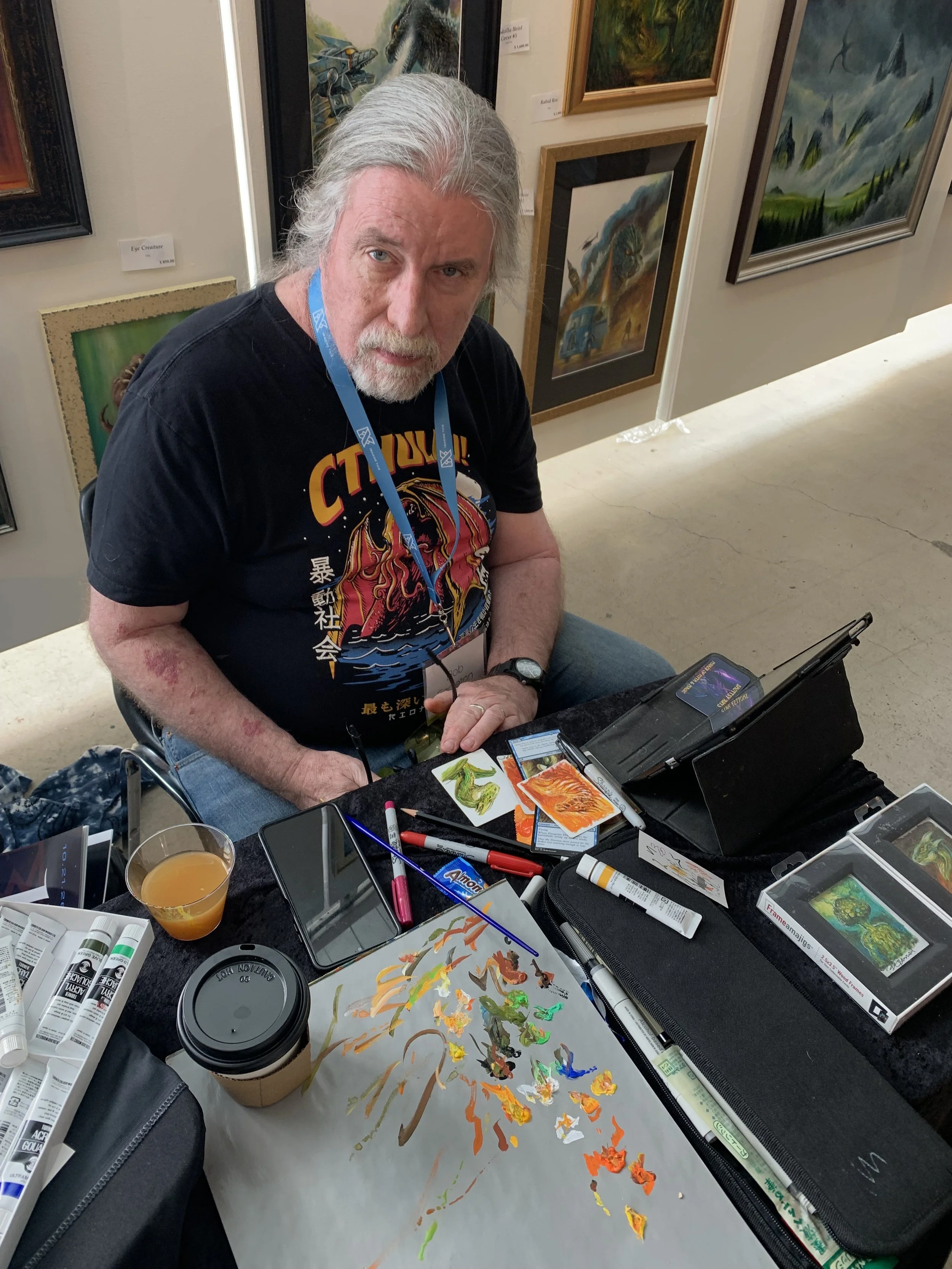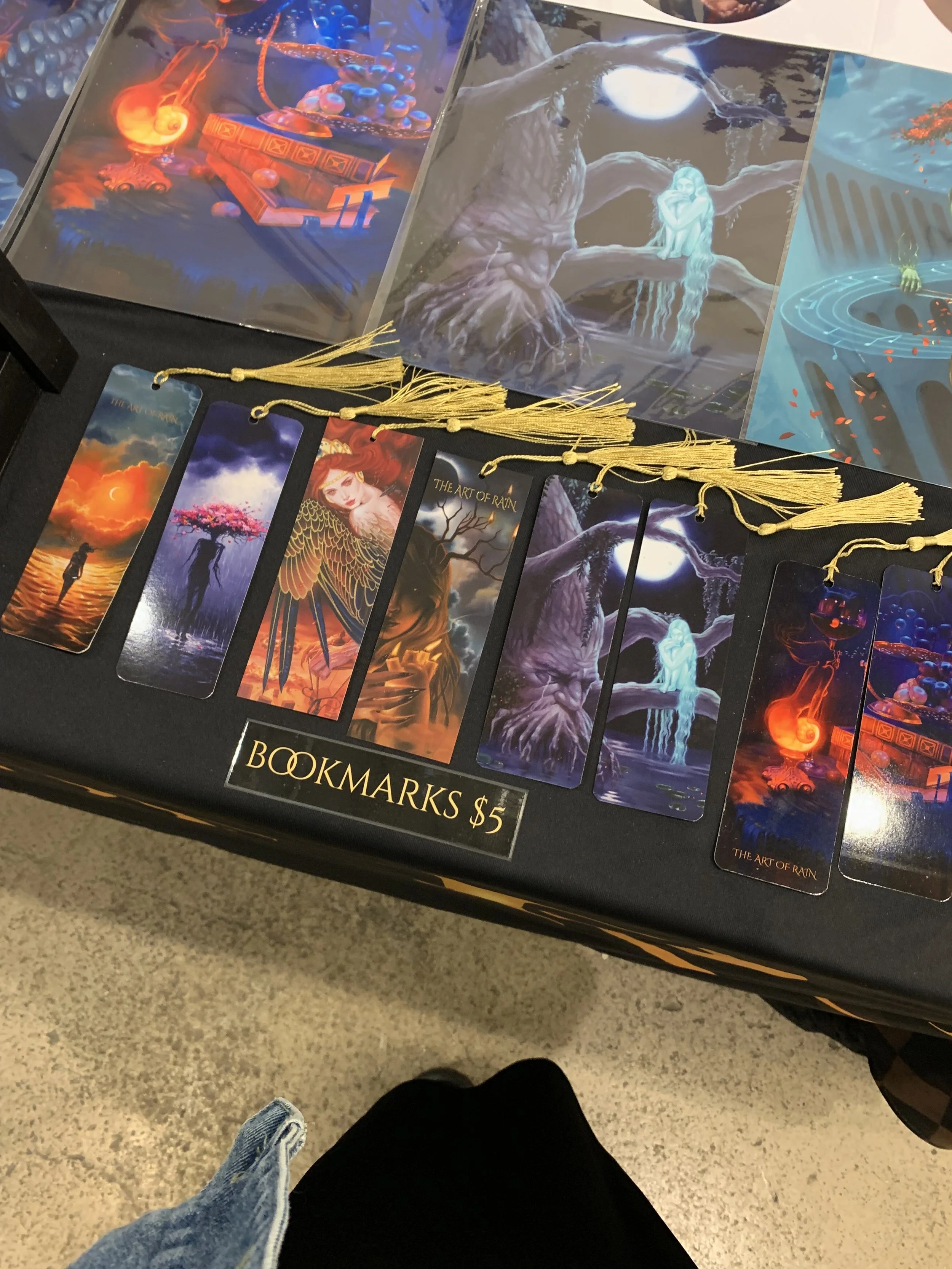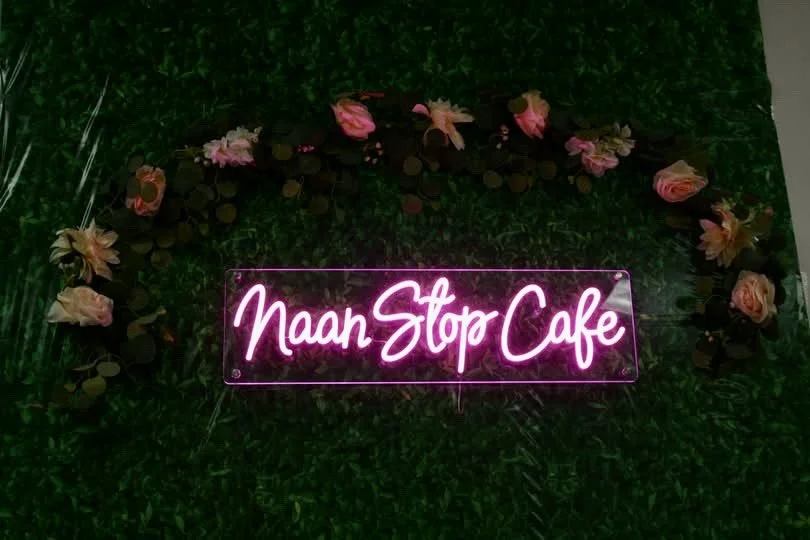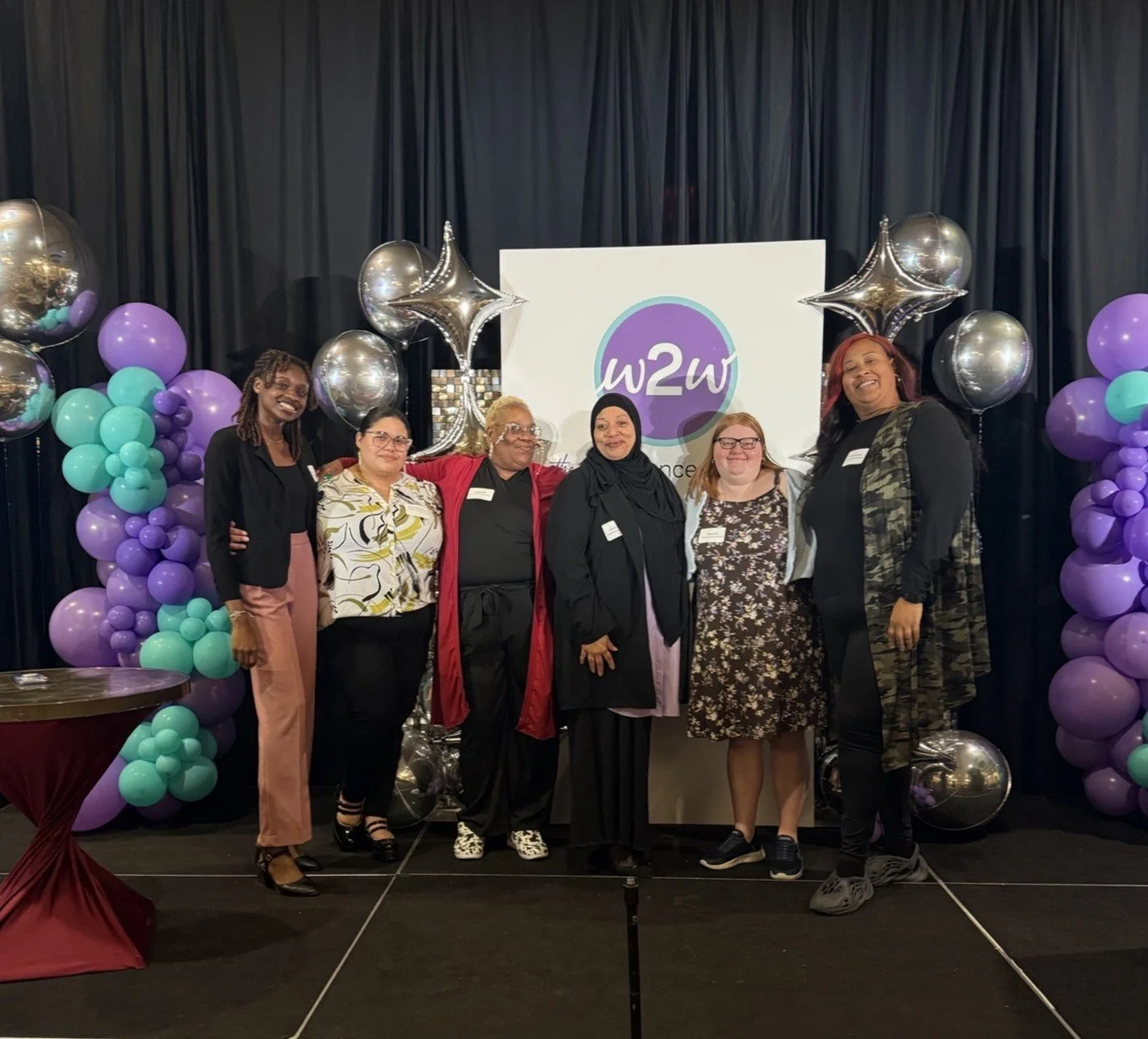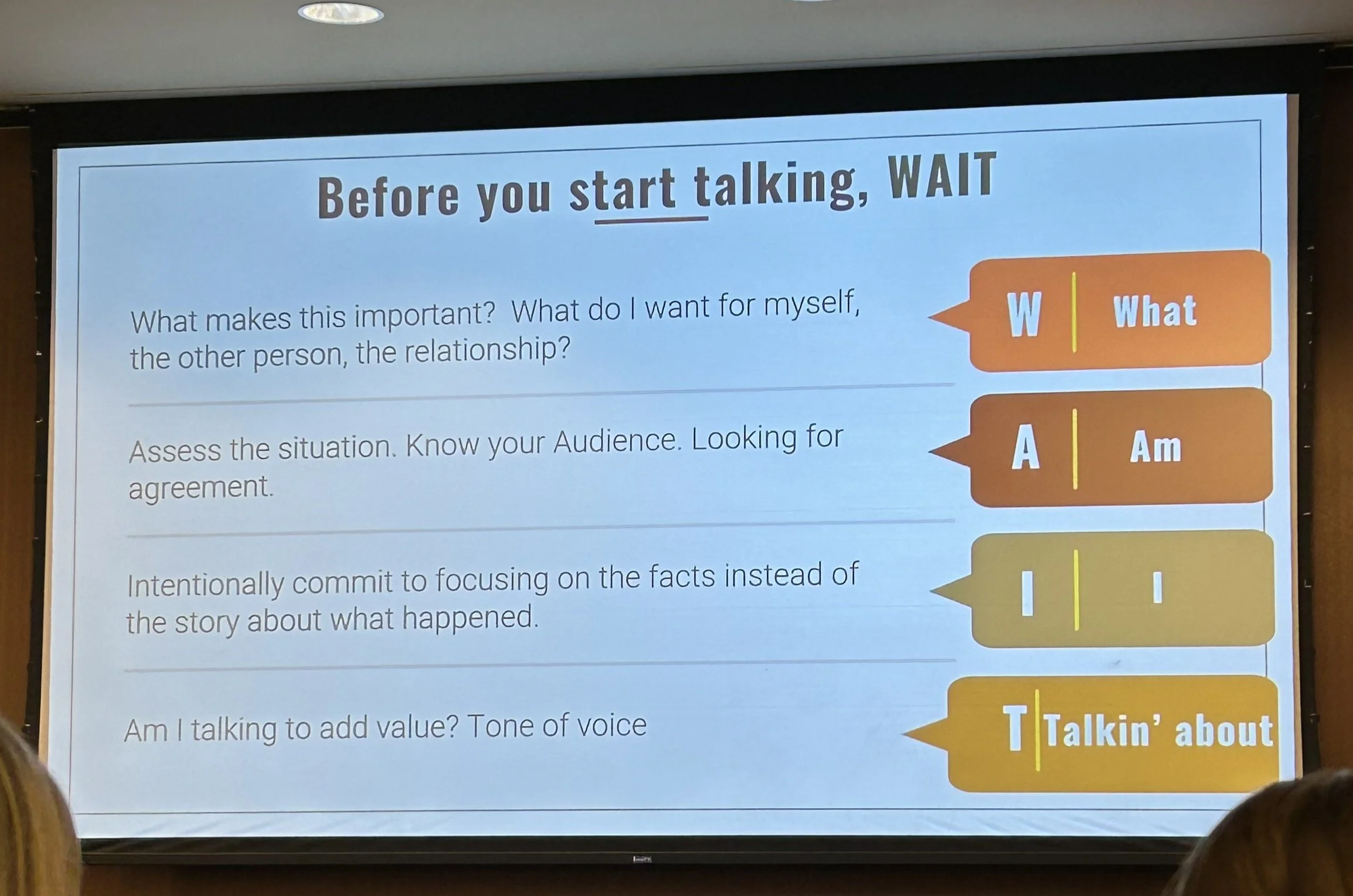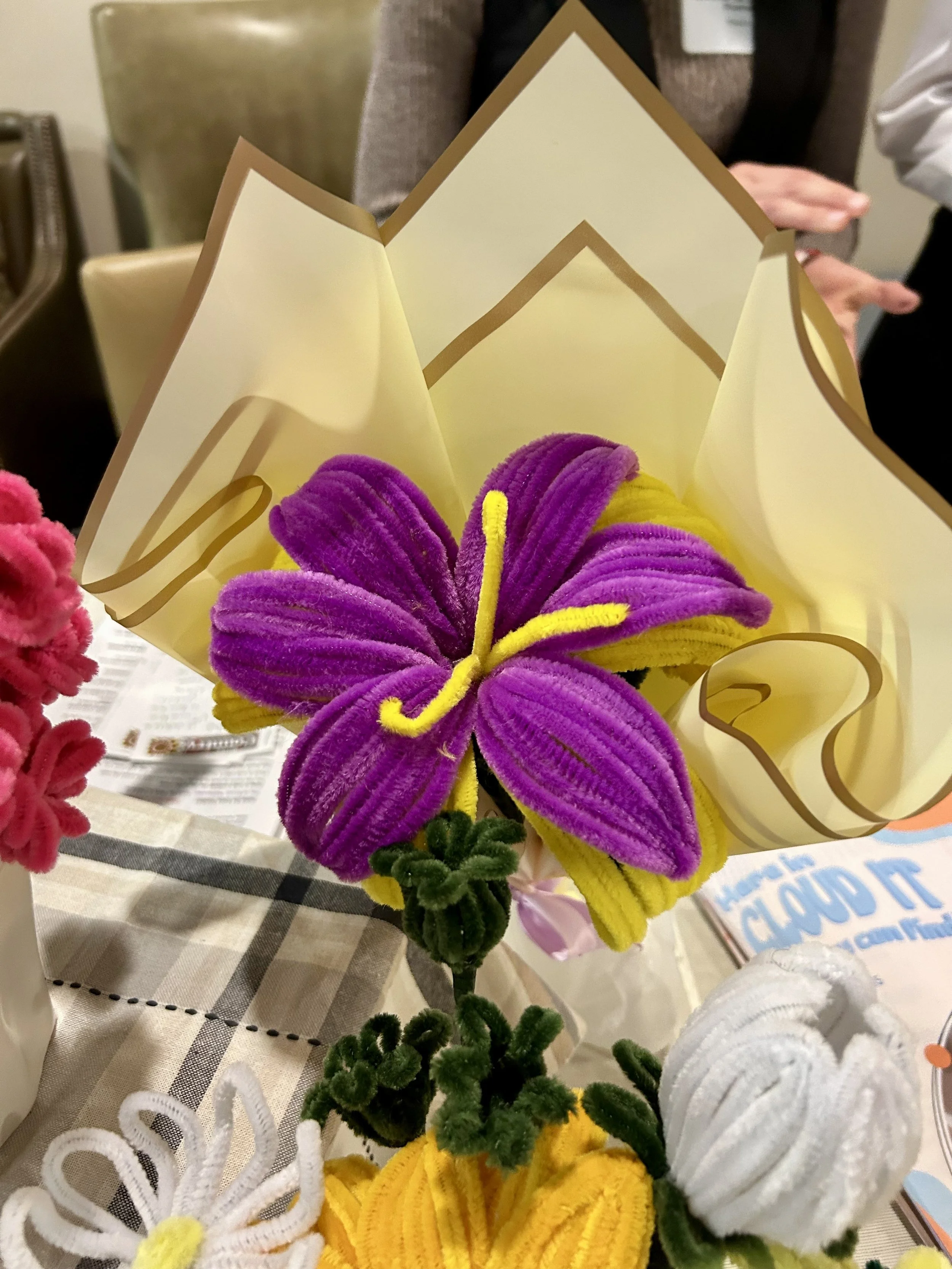A Written Memory
Abigail Martha
November 12, 2025 - Both of the times I met my favorite author changed the trajectory of my life.
For the longest time, I didn’t pick up books. My time in my teen years and into my adolescence were spent occupying other hobbies. But I always loved the idea of fantasy, from dragons to wizards to elves, you name it. I played countless games and watched various movies with fantastical elements, but never thought something so magical would be found between the pages of a book. And after I read my first book, it turned into the whole series, and then from there, my hobby of reading practically flew off into the wind and took me with it.
When I remember the first time I met her, I recall feeling like I had never been in a room full of more people who like books who were probably feeling the same nerves I was.
Alex Aster, my favorite author who created the Lightlark series, was on tour. Lightlark, at the time that I found it, was unlike anything I had ever read before. It was told in the third person, which was new for me as a reader, and followed the main character, Isla Crown, as she explored the different kingdoms and met the rulers for the “first time” in her life. A series so enchanting that my attention was captivated right away. I felt like I couldn’t put the book down, and by the time that I did, I was picking up the second one with itching hands, the plot of the story still so fresh in my mind, having found my favorite characters, unaware that this world and its creator would change me for the better.
My boyfriend, Josh, and I stood together in the winding line of people, all here for the same reason. We arrived at Rosemont College, which is outside of Philadelphia, Pennsylvania, for the first day of her book tour. Josh, being a great boyfriend and my number one supporter, entertaining my interests always without questions, drove us to our destination, and even let me read the final few chapters of her newest book, Skyshade, with my flashlight on in the dark car.
With my nose still buried in my book, he had said to me, “You’re going to finish that book before you even meet her, and it only came out yesterday.”
“She’s my favorite author,” I had told him, making sure I knew what line I stopped reading on before I looked over at him. “I want to make sure I finish it before I meet her.”
“By all means,” he started, driving us further into the November night. “Keep reading.”
The anticipation ate at me as I watched the line of people move, fixing the crown on top of my head, smoothing the cape across my shoulders and back. I was even dressed up for this event, adorning my body in clothes and costume pieces to represent my favorite character from the series, Grimshaw Malvere, the ruler of the Nightshade kingdom.
As the suspenseful minutes went by, my nerves were set alight, and the books in my hands were heavy. I remember giving Josh an anxious smile as the girl in front of me went to the table and started talking to Alex, to which I received a supportive thumbs up. I knew I only had a few minutes to talk to her, so I had to make the time count.
And as I finally stepped up to the table, with my worries in my stomach, Alex Aster and the content creator sitting next to her smiled up at me. We talked about her books, my costume, the fact that we both had crown rings on fingers on our hands, and my name, which I had recently just changed from Abbi to Gail. She told me that she almost used my name in the book to represent “wind,” and that simple sentence became something I would never forget.
I’ll also never forget how she once said, “write the books you want to read.” I had started writing a few months prior to this. I never expected to find something in writing books, alike to the ones I was reading. My own characters, plot lines, and even series began to bloom in my head, and I didn’t know what to do with them. Josh had told me that there was no harm in writing them down, so that’s what I began to do in August, right before my final semester of college began, right as I started to question who the hell I was, and what I wanted out of this life.
But mere ideas turned into scenes, and I kept writing, finally finding a sense of purpose and calm as my education was the hardest it had ever been. I had finally found something to keep me busy, a hobby that I could be passionate about while I tried to find my place in the world, desperately trying to discover an identity that I was realizing I knew less than these fictional characters, these people that weren’t real, that knew their sense of self because I knew it.
No one wants to tell you how hard it is to complete your degree, especially when you don’t know what is coming next for you. As I reflect now, I realize that perhaps that’s because only you have to be the master of your own life, and someone can’t write your story for you. But I remember the crushing feeling, the weight of the pressure of knowing what to do afterward, to grow up and figure it out. I was supposed to already have it figured out. But I didn’t. And writing, as great as it was for me, had blossomed its way into my heart, and almost made me more confused than I already was, about who I was and who I wanted to be.
Writing made me feel alive, and fulfilled. And knowing that, made me so scared I hadn’t found it sooner than I did. Reading, Alex, and her series of literature became that calm in the storm. Writing, and books, had introduced me to a world I had never known existed beforehand, and even led me to a community I was happy to finally be a part of, introducing me to some of my closest friends.
It was the most bittersweet flavor I have ever tasted. And words, no matter how good I think I am at writing them, will never be able to express the weight of the emotion of knowing what you want after not being able to find it for so long, feeling as though you are way too late.
When I met Alex Aster the second time, I was even more lost than I was during the first.
I had finally completed my degree in the months leading up to this, and was knee-deep in job searching, which ended me up with a lot of completed applications with no responses back, desperation finding me again as I grasped at any career building opportunity I could apply for, even if I wasn’t truly interested in them. All while I was still writing.
Della, one of my best friends I found through our shared interest in books, Delle-Belle as I often call her, joined me on my pilgrimage to New York City to meet Alex again. Della and I met through our jobs at Starbucks, and were basically inseparable when she came back from her leave after her husband, Jo, passed away. Both of us needed someone to lean on, someone to just listen and understand, and as cheesy as it is to say we found one another when we needed to, we really did. And months from then, months from now, as I’m writing this, we’ll continue to lean on one another for that kind of support you can only get from your closest friend.
We stood in line together, the tight cluster of people woven through the aisles of the Barnes and Noble in Union Square, like fabric that keeps clothes together. It was my second time at this store, second time meeting my favorite author. Ironically, the first time I was here was on my twenty-third birthday, and I was here to get another signed copy of Alex’s books, my first autographed one, that felt like a trophy to me.
The memory of the second time I met her, when I think back on it over half a year later, holds the same excitement that any birthday would. But when that exhilarating feeling leaves, like the glow of the adrenaline after a music concert, something heavier takes its place.
Della looked down at her books, at the multiple editions we spent the entire morning running around for, and then up at me. “You look nervous.”
“I am nervous,” I told her, counting my own editions in my hands, making sure one hasn’t teleported since I had pulled them out of my bag. The same as the first time I met Alex, there was only one person in front of Della in line, and our chance to get our books signed was so close I felt like I could feel it in my toes. “Last time I met her, I couldn’t stop shaking.”
I hadn’t necessarily lied to my friend; I was nervous. But it was way more than just because I was about to talk to Alex again. I was in this big city of dreams, where anything is possible, feeling miniscule compared to the tall buildings and large crowds. I felt like I was just a person, lost in a concrete jungle, unsure of what they really wanted to do with their life, and wondering, and regretting, if the education I had just completed was worth it. It didn’t feel like it was, and knowing that, remembering that feeling, still makes my stomach hurt.
I was supposed to be enjoying this moment, that would forever be a memory I will never forget, but I found myself worrying about what I couldn’t change instead. That bittersweet emotion resurfaced, and it made me nauseous. And I didn’t want to talk about it, I didn’t know who to talk about it to. I didn’t know if I sounded justified in my worries at all, craving a life, a career and a legacy, that at the time felt like the impossible.
Della gave me a reassuring smile, an act of comfort similar to the one Josh had gifted me in this scenario before, right as she left me alone on the stairs of the stage. And for a moment, the emotions I had didn’t seem to be filling my lungs with water that wasn’t even present, the words I didn’t say to her, but would the next day. “Just be yourself, Gail. Make sure you don’t forget to give her that necklace you made. I’ll take a video for you. Don’t worry.”
Those last two words lodged a lump in my throat. I remember thinking about, again, how much had changed for me since I picked up my first book, since I picked up one of Alex’s books, the author who I was there to meet that remembered me on the street that very morning. Since I made my first document, since I typed my first words of a story I couldn’t stop seeing in my head, since I made characters and plot lines that were… Well, mine.
I was finding myself writing more than I was reading at this point, which is still true to this very day. Lost in my head, in a world that I fabricated out of thin air, finding comfort in my own literature, like it were lines of scripture I found a sense of believing in. Writing had become everything to me, and even as I walked around aimlessly on the path of life, it still felt like home.
Realization slapped me in the face as I stepped up to the table to meet Alex again. I had always thought I knew who I was, but I never realized that I didn’t know who I wanted to be. I knew my qualities, interests, and beliefs like the back of my hand, but didn’t know my goals, dreams, and wants. That there is no time frame for life, no set in stone clock that tells you when you’re going to know who you are, that sense of identity we spend our early years searching for. And that I could find it whenever I happened about a fate that I wanted to be mine.
Months later, I sent out my application to RACC for the Creative Writing program, filled with the overwhelming support from my family and friends, pushing every day to a dream I know I can obtain. Every step I took in my journey of self exploration led me there, here, and into the future, the one that no longer is as frightening as it was before. My pen name, Abigail Martha, identities who I was and who I can become, my fight for my dreams, and the bright future I know is ahead of me, because I’m too stubborn, and hard-working, for it not to be.
One day, when I’m asked about my own books, what inspires me to be an author, I’ll know what to say. Because now, I know who I am. And my identity, my sense of self, my destiny forged between the pages of my book of life, will never leave me.
My first time meeting Alex Aster for the Skyshade event.
Our crown shaped rings.
My second time meet Alex Aster for the Summer in the City event.
The IX Art Show 2025 at the Goggleworks
Abigail Martha
October 25, 2025 – The Goggleworks, located on Washington Street in Reading, PA, is a large, non-profit arts and culture center, housed in the former Willson Goggle Factory building. It’s a creative hub in a sense, offering art classes, galleries, workshops, and a movie theater, housing art studios for local arts organizations.
With its mission being to foster creativity and community through art, this is a perfect place for the IX Art Show to call home every year.
The IX, Imagine This, Art Show was founded in 2008, and is the first, ground-breaking art show and celebration dedicated to imaginative realism, bringing all walks of life together to inspire, create, network, and appreciate the realm of the fantastic and make-believe. Each artist has a display of their creative worlds, whether it be oil paintings, sculptures, digital drawings, or something in the midst of that, and are free to sell their work to those that are interested in buying something for their collection.
I attended the Saturday portion of this art show, and immediately was in awe, not just of the skills and craft I was seeing, but also just of the immersion of this community of people coming together with a similar interest in mind. Everyone was so kind and welcoming, and even helpful in letting attendees scroll through their works of art and make themselves at home in their booths.
My favorite part was getting to view artists creating work right in front of my eyes. I am better at art through my power of words, not through illustrations, and am always starstruck by those with this creative ability. I stumbled upon artist Bob Eggleton, who just so happened to be painting a dragon, and got to chat and watch him create one of my favorite mythical beasts right in front of my eyes. When I asked him how long he has been doing art for, he said he started when he was just four years old! Talk about passion and talent!
Interested in learning more? Want to go next year? Check out the IX Art Show website here:
Artist Bob Eggleton
New Small Business on Mount Penn: Naan Stop Indian Grocery
Jason Brown
October 22, 2025 - Hope itself doesn't just thrive in the streets of Reading, but even outside of the city, in small business places for the public to see for themselves. The Naan Stop Indian Grocery store, located on 2548 Perkiomen Avenue, Mount Penn, PA 19606, opened their doors on August 20, 2025. The owner, Alishba Khan, along with the chef, Iram, gave us an inside look at their small business on Mount Penn.
Just like any other small store in the city of Reading looking out for their community, the people of Naan Stop are here to serve not only the community itself, but also by bringing a little taste of their culture for everyone to try.
Bringing to the table hot served meals, everyone is welcome, whether you’re local or new in town, looking to try something new to eat, or grocery shop for things that you have never seen before.
Naan Stop sells delicious food served by one of their best chefs, jewelry, snacks from the Indian culture, refreshments, and other accessories. And if you’re looking to try any of their food items, try the gyros and a cup of chai.
Photos by Jason Brown
Breaking the Silence: Men's Mental Health Matters at RACC
Latisha Kelly
June 13, 2025- June marks Men’s Mental Health Month, a time to challenge the outdated idea that strength means silence. To shed light on this vital topic, I sat down with Nick Garofalo, a passionate advocate for mental wellness and Mental Health Counselor at Reading Area Community College, to discuss the unique challenges men face, especially within a college setting.
“We need to stop pretending nothing Fazes us.”
Nick emphasized that American culture has long taught men to be stoic, tough, and emotionally unshakeable. “That mindset is contrary to human nature,” he said. “Everyone deserves a place where they feel heard where someone is actually there for them.” This rings especially true on college campuses, where male students often face high levels of stress, identity crises, and academic pressure with very few spaces to express themselves. When asked about common mental health struggles, Nick didn’t hesitate: “Depression is a big one. But it doesn’t always look like sadness it can come out as anger or frustration.” Men often bottle-up emotions until they explode, which can lead to relationship strain, substance use, or even suicidal ideation. Despite these struggles, many still hesitate to seek help.
Nick noted that while societal views are slowly changing, there’s still a lingering discomfort around men openly addressing mental health. “We are seeing more guys recommend therapy or talk about their own experiences without being forced to. That’s a big shift.”
RACC students have access to a wide range of local resources, many of which offer sliding-scale fees or dual diagnosis support. Nick shared the following options:
Berks Counseling Center – 645 Penn Street | 610-373-4281
Caron Treatment Centers – Dual diagnosis treatment | 888-915-0295
Threshold Rehabilitation Services – 1000 Lancaster Avenue | 610-777-7691
Peace and Harmony House – 1150 Berkshire Blvd | 610-750-6015
Berkshire Psychiatric – 1800 N. 12th Street | 610-816-5728
Hearth fire Psychology – 220 N Park Rd, Building 5 | 610-823-7799
PA Counseling Services – 125 S. 5th Street | 610-685-2188
Psychology Today – A great online tool to customize your search for licensed therapists: growtherapy.com/n
When it comes to supporting friends or classmates, Nick said it best: “You don’t need a license to listen.” Simply offering a safe space, validating their concerns, or accompanying someone to a support center can make a world of difference.
Culture and Stigma
Culture and upbringing play powerful roles in how men handle their emotions. “Every culture has different values when it comes to masculinity,” Nick noted. He referenced Pose, where a character says, “I learned from the three of you how to be a man.” That line underscores the importance of mentorship, vulnerability, and redefining what it really means to be a man.
Words of Advice
To any male student struggling in silence, Nick offered heartfelt guidance: “Find a way to express it. Write it down, talk to a friend, or call a hotline. If you’re in crisis, go where people are, it can help keep you grounded.” He used this as an analogy, “If I’m bleeding, I may not be able to fix it, but if I get to the hospital, I know someone can patch me up.”
What Can We Do
Nick believes the more we talk, the more we break the cycle of silence. “Someone will read this, or watch a documentary, and finally make a move toward helping, also support groups are powerful. There’s a lot of support in struggling together.”
At RACC, we’re ready to do the work to listen, support, and grow together. Men’s mental health is not a trend. It’s a movement, and it starts with one conversation.
If you or someone you love is struggling please call, text, or even chat on the Suicide and Prevention website. Simply dial 988 or check out their website at https://988lifeline.org/?utm_campaign.
At the 988 Suicide & Crisis Lifeline, we understand that life's challenges can sometimes be difficult. Whether you're facing mental health struggles, emotional distress, alcohol or drug use concerns, or just need someone to talk to, our caring counselors are here for you. You are not alone.
Photo Credit- Kym Kleinsmith
RACC Students Attend Women2Women Conference
Angela Caldero Perez
May 3, 2025—On Wednesday, April 16, the Greater Reading Chamber Alliance (GRCA) held its 14th Annual Women2Women (W2W) Conference & Expo at the DoubleTree by Hilton Hotel from 8 a.m. to 3:30 p.m.
The W2W is a wonderful program of the GRCA that brought together more than 300 amazing women who had the opportunity to network and focus on both personal and professional development. It was an inspiring event featuring female-owned businesses and community leaders from Berks County. Among the organizations in attendance were, Alvernia University, small business Cloud It, Animal Rescue League of Berks County hosting a Kitten Corner, A Sense of Purpose, Children’s Home of Reading and much more.
A special shoutout goes to Jamica Andrews in student life for making it possible for several RACC Students to attend this fantastic event! Kicking things off was the inspiring Keynote speaker, Jane Winchester Paradis, Owner and founder of Jane Win Jewelry. She shared her captivating presentation, “From Passion to Prosperity: The Journey of an Entrepreneur,” where she opened up about her beginnings and how she built her fabulous business and took the time to answer questions from eager members of the audience.
Afterward, RACC students eagerly participated in several breakout sessions, including a session on financial management titled “Love, Sex, & Money” led by Regina Rinehimer. They also attended “Communicating with Clarity & Care,” presented by Audrey A. Simmons. This segment focused on clear communication and providing feedback with confidence, integrity, and emotional intelligence. This segment was particularly popular among RACC students, who felt "much wiser” after attending.
Students had the chance to engage in one-on-one sessions with accomplished women who provided valuable insights from their professional experiences. Among these influential women was Dr. Glynis A. Fitzgerald, the president of Alvernia University. When asked if she had envisioned this role at the start of her career, Dr. Fitzgerald stated that she had not anticipated it but welcomed change and opportunities as they arose, encouraging students to do likewise: pursue your own path and embrace new possibilities without hesitation.
The women of the conference enjoyed lunch together and a number of goodies provided by the many vendors on-site. The conference ended with a member of the audience winning the raffle for their very own June Win Pendant.
This celebration of brilliant women and minds united a community that encourages growth and inspires at every turn. The RACC participants are deeply appreciative of the chance to learn and connect with so many remarkable women.
RACC attendees Cheyanne Alvin, Angela Caldero Perez, Latisha Kelly Jamica Andrews, Kaylee Fell, and Chavonna Cooper.
Black History Should Be More Than a Month
By: Latisha Kelly
February 27, 2025 - Black History Month is a time dedicated to honoring the achievements, struggles, and contributions of Black individuals throughout history. However, as a Black woman, I find it frustrating that our history is largely confined to the shortest month of the year. The legacy of Black people in this country is far too vast, too deep, and too impactful to be acknowledged for just 28 days. Black history is American history, and it should be an integral part of school curriculums and everyday conversations—not an afterthought or a seasonal observance.
The truth is this country was built on the backs of my ancestors. From the forced labor that powered the economy during slavery to the activism that pushed the nation toward justice, Black people have been at the center of America’s story since its inception. Yet, history books often downplay or whitewash these contributions, reducing Black history to a handful of figures like Martin Luther King Jr., Rosa Parks, and Harriet Tubman, while ignoring the vast number of Black leaders, inventors, scholars, and everyday people who shaped this nation.
The impact of Black Americans stretches far beyond the Civil Rights Movement. Figures like Madam C.J. Walker, the first self-made female millionaire in America, and Katherine Johnson, the mathematician who helped send astronauts to the moon, are often overlooked. The Harlem Renaissance, which transformed art and literature, and the countless Black soldiers who fought in wars for a country that didn’t even grant them basic rights—these stories deserve to be embedded into the fabric of history lessons just as much as the American Revolution or World War II.
Black history should not be something students only learn about when February rolls around. It should be common knowledge. Schools should integrate Black history into their curriculum year-round, discussing topics such as the real economic impact of slavery, the role of Black leaders in labor movements, and the cultural significance of Black music, literature, and traditions. Black children, and all children, deserve to see a fuller, more accurate representation of history that includes the contributions and struggles of Black Americans.
Additionally, reducing Black history to a single month often leads to performative recognition rather than genuine understanding. Corporations and institutions roll out temporary campaigns, post a few quotes, and then move on as if the work is done. But true recognition means uplifting Black voices, addressing systemic inequalities, and making a commitment to historical truth every day, not just in February.
While Black History Month serves as a reminder of the importance of acknowledging our history, it should not be the only time that these conversations happen. Our history is ongoing, and our contributions continue to shape the world today. Until Black history is fully recognized as American history—taught in classrooms, discussed in boardrooms, and celebrated in all aspects of society—we still have work to do.
RACC Presents Local Premiere of Escobar’s Hippo
Latisha Kelly
December 9, 2024 - On November 17, 2024, Reading Area Community College (RACC) Theater Department performed Escobar's Hippo: Based on a True Colombian Conundrum, a new play by award-winning playwright Franky D. Gonzalez. The play, directed by Ellen "Dash" Walter, staged at RACC's Miller Center for the Arts, centers around the fascinating and little-known true story of the hippos that were introduced into Colombia by the infamous drug lord Pablo Escobar, exploring the unexpected consequences of Escobar’s actions. After Escobar’s death, his private zoo, which included a group of hippos, was left unchecked. The hippos eventually escaped into the wild, becoming an invasive species and posing environmental challenges in Colombia.
In a small Colombian town along the Magdalena River, chaos erupts when a mischievous and destructive hippo arrives, leaving a trail of destruction in its wake. This flatulent, easily offended, and incredibly adventurous animal quickly becomes a force to be reckoned with, wreaking havoc on the once-peaceful town. The situation takes a surreal and alarming turn when the townspeople begin to transform into hippos, sparking nwidespread panic and social upheaval as humans, now evolving into "Hipposapiens," trample over one another in a bizarre, animalistic frenzy.
As the town falls into disarray, three friends band together to uncover the strange connection between these transformations and the infamous drug lord, Pablo Escobar. Their journey becomes a race against time as they attempt to find a way to stop the escalating crisis before the human race is overrun by hippos.
This uproarious and absurd play, inspired by the works of Eugène Ionesco, particularly Rhinoceros and The Killer, uses dark comedy to explore the dangerous consequences of surrendering one's humanity in favor of base instincts and self-gratification. Through humor and chaos, it raises important questions about the erosion of societal values, the loss of individuality, and the dangers of blind conformity. As the play unfolds, the audience is forced to confront the absurdity of the situation while grappling with its deeper, more serious implications.
At its core, this play is a reflection on the dehumanizing effects of power, greed, and indulgence, highlighting the fine line between civilization and chaos. With a mix of wild absurdity and chilling insights, Escobar’s Hippos is a bold, thought-provoking exploration of the unexpected and sometimes dangerous consequences of living without limits.
Promotional poster for Escobar’s Hippo (source: The Miller Center for the Arts, Reading Area Community College)
Gonzalez’s script masterfully blends historical fact with poignant drama, turning this bizarre and humorous situation into a compelling narrative. The cast brought these characters to life with impressive depth and energy:
Jeremy Weaver as the narrator
Justin Perez as Bernardo
Justin Medina as Juan
Samantha Pineiro as Dalis
Susanna Naugle as the mysterious Cat
Kaysha Rivera, Annalis Ortega, Nayla Wansley, Madison Hill, and Jaia Rahn as the townspeople
Tim Spatz as Escobar’s Hippo,
Madison DJ Fields, TJ Trivic, NancyRose Dotterer, Max, Jewel, Alastair Krick, and Bianca “Bee” Kline as the production crew
The production, while humorous at times, also raised thought-provoking questions about the unintended consequences of human actions, both on the environment and on society. The hippos, once a symbol of Escobar’s wealth and power, transformed into a living representation of the chaos he left behind. The play reminds us that our actions, even those taken in the pursuit of personal gain, can have consquences.
Celebrating the Jewish New Year:
A Conversation with Professor Margie Kerbel
Zara Quintana
October 10, 2024 - Wednesday marked the start of Rosh Hashanah, a sacred and significant holiday for those of the Jewish faith, a time for reflection and renewal falling during the late summer or early autumn. Professor Marjorie A. Kerbel shared the importance of this holiday.
Q: For anyone who might not know, What's Rosh Hashanah?
A: Rosh Hashana is the Jewish New Year. It is a time of reflection, prayer, and planning for the upcoming year. Rosh Hashanah means head of the year in Hebrew.
Q: How do people celebrate Rosh Hashanah?
A: Family and friends worship in synagogue followed by a festive meal. The shofar (ram's horn) is blown to remind Jews to think about their sins from the past year and ask G-d for forgiveness and to be written in the Book of Life for another year. On the afternoon of Rosh Hashana, many participate in a ceremony where you throw bread into a river or stream. This symbolizes throwing away your sins from the year and starting a fresh new year.
Q: On a personal level, what does Rosh Hashanah mean to you and how do you and your family celebrate?
A: My family and I attend synagogue and then get together to have a festive meal.
Q: Are there any specific symbols or items used in Rosh Hashanah?
A: On Rosh Hashana, we eat apples dipped in honey to pray for a sweet new year. We also eat pomegranate seeds. There are 613 seeds in pomegranate to remind us that all of us should do 613 good deeds each year.
Q: Have you seen any shifts in how people celebrate today versus how they would celebrate say 20-30 years in the past?
A: Celebrations have not changed over the last 20-30 years for me and my family and friends.
Q: What is your earliest memory of this holiday? What do you remember about celebrating this holiday when you were younger?
A: My fondest memories are having Rosh Hashanah dinner with my grandparents and some close friends, who are our chosen family. Several of the women would make matza balls for the soup and we would do taste tests on which were the best. The Cantor from the synagogue would stop by the house and play his guitar and sing with us after dinner.
A Production to be Moved by:
Spitfire Grill
Hartej Singh
October 7, 2024 - On October 5th, Genesius Theatre hosted the production of Spitfire Grill, a heartwarming and enthralling musical. I was lucky enough to attend the showing and sit just feet away from the stage! As the musical began, I was quickly immersed in art entertainment.
“Spitfire Grill” is a musical about a woman named Percy, newly released from prison. She moves to a fictional small town named Gilead, where she is initially not really welcomed. The only person who welcomes her is Joe, the town's sheriff, who we later find out has a crush on Percy. Joe offers her a job at the Spitfire Grill, where she meets Hannah, who becomes Percy's grandmother figure. Hannah has a son, Eli, who went AWOL in the military. No one in the town really knew what happened to him, so it came as a surprise when he appeared one day. Everyone was freaked out, and only Percy and Hannah accepted him into the Spitfire. The show ends with Hannah giving the Spitfire to Percy and another character named Shelby. Percy ends things with Joe, and Shelby becomes her own woman after leaving her controlling husband.
After the show, I had the opportunity to interview Shara Althen, who plays Percy; I asked her what her favorite memory of the show was. This was her response, “I really loved the first rehearsal. You get to meet your fellow castmates and really get into a groove that lasts you the entire show. I also loved the opening when you get to perform all your hard work in front of an audience for the very first time.”
I also interviewed the Director of the show, James Haggerty. He explained what his favorite memory of the show was. “First night, when everyone gets to see your vision of the show, and you get everyone’s feedback, when the set is all together, and you truly see what your months of hard work have been for.”
Overall, this musical was a heartwarming, at times comedic drama that you would have to see to believe. I recommend attending a showing if ever given the opportunity; it is truly a timeless tale.
Learn more here: https://genesiusdifference.org/the-spitfire-grill/
